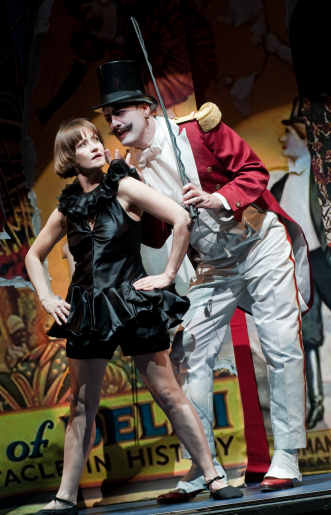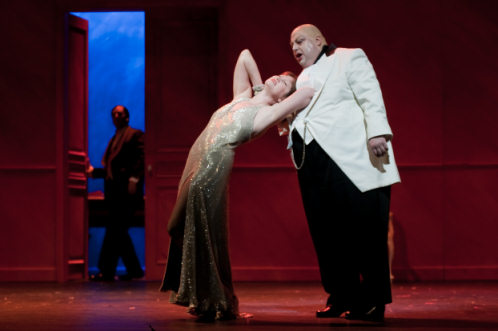Other Links
Editorial Board
-
Editor - Bill Kenny
-
Deputy Editor - Bob Briggs
Founder - Len Mullenger
Google Site Search
SEEN AND HEARD INTERNATIONAL OPERA REVIEW
Alban Berg, Lulu:
New production directed by Peter Stein (co-production with La Scala
and the Vienna Festival). Soloists and orchestra of the Opéra de
Lyon, Kazushi Ono conductor. Lyon, France. 2. 5.2009 (MM)
The twentieth century was obsessed by sex - at least as evidenced
by three operas seen last week, Le Chateau de Barbe-Bleue and
Hindemith's Sancta Susanna in Montpellier, and now Lulu
in Lyon. All three are in the shadow of the Salome (1907),
the first of the recent century’s erotic operas. This Strauss opera
is of biblical subject, its horrifying specifics well within the
expressive means of a hyper post-Romanticism. Bartok's
Bluebeard's Castle (1911-1917) on the other hand moves in
archetypical and mythical spheres with the consequent obfuscation of
precise sexual meanings, exploiting to the fullest a rich and
complex, late-Romantic musical language.
Laura Aiken as Lulu and Stephen West as Dr. Schön
Unlikely as it might seem, the contrived dramatic and musical
complexity of Lulu, its absolute lack of charm, and its
ludicrous story seem to fascinate rather than irritate audiences.
Such was the case at the May 2nf performance in Lyon when at the
bitter end (four plus hours) the audience roared its appreciation.

Laura Aiken as Lulu
Hindemith's Sancta Susanna (1922) is from this composer's
so-called radical early period. It is a tawdry tale (a young nun
detaches Jesus' loin cloth and disrobes herself in the presence of
her horrified convent sisters). However Hindemith's prim
modernized and still tonal musical language does not come close to
breathing life and meaning into this silly sensationalism (Hindemith
later withdrew this work from his oeuvre).
But Alban Berg's Lulu (1929-1935) takes an equally tawdry
tale through the paces of an advanced twentieth century language and
makes something of it. Like Bluebeard's Castle and Sancta
Susanna, Lulu is a process rather than a drama. Lulu is
the epicenter of a series of bourgeois sex scandals. Her
fatal attractiveness is the true perpetrator when, eviscerated by
Jack-the-Ripper, she becomes the final victim of her sexual allure;
but not before seven or so other corpses have hit the floor. As in
Wozzeck, Berg imposed a solid form for Lulu, here a
mirror structure (the first half is replayed exactly backwards as
the second half) within which his actors communicate in individual
twelve tone rows.

Lulu was American soprano Laura Aiken, a veteran of Lulu
productions in Berlin, Amsterdam and Paris. As an operatic femme
fatale (which ladies are truly deadly) Mme. Aiken recently
embodied the Lulu-like Manon in Hans Werner Henze's Boulevard
Solitude in Barcelona as well. Though no longer a young Lulu,
she is a vocally resplendent and very musical one, still capable of
the role's considerable physical demands. Unfortunately she was at
the disadvantage of costumes that were sometimes ugly and other
times ridiculous. And finally the musical brilliance of Mme. Aiken
was at odds with Lulu’s mindless carnality; this conflict the
daunting challenge of the role.
Dr. Schön was American bass baritone Stephen West, another veteran
of Lulu productions (this same role in Berlin, Paris and
Salzburg). Mr. West succeeded in creating a Dr. Schön of sufficient
size to tower over all the other lovers as Lulu's first, and as
Jack-the-Ripper, her final lover. Mr. West accomplished this with
an almost buffo acting technique (though he is not a basso buffo,
preferring the imposing dramatic repertory) and while this worked
well to bloat physical size, it did not give Schön the stature of
character or the basic intelligence needed to embody the bourgeois
social stratum that Lulu fascinates and which Berg abhors.
Among Lulu's other victims, the Countess Geschwitz of Hedwig
Fassbender stands out as Cadillac casting, though her two line
‘Liebestod’ to Lulu was far removed from the splendid Liebestod of
her Montpellier Isolde. To a man, Lulu's male victims were
convincing, their performances smartly delivered - especially
striking were the Alwa of tenor Thomas Piffka and the trapeze artist
of baritone Paul Gay. Effective as well were the Artist of Roman
Sadnik and the Schigolch of Franz Mazura. Perhaps the one slightly
sympathetic role is that of the young student, richly drawn vocally
and histrionically by Magdalena Anna Hofmann.
The metteur en scène was Peter Stein. He situated the action
between realism, caricature and cartoon. Maybe the ridiculously
dressed Lulu in Dr. Schön's drawing room was meant to resemble a
clown, and the sets for this scene to be a caricature of Bauhaus
architecture and interior decoration. But these ugly, sleek images
were at visual odds with Berg's quite beautiful musical process. On
the other hand, the red drenched color of the otherwise bare
cartoon space of Lulu's Paris apartment was right-on, and Mr.
Stein's staging of this magnificent ensemble scene where the sexual
tensions were transformed into financial tensions was elegant in its
complexity, just like Berg's music. Smaller scenes were caricatures
of realism, though in more effective moments, the staging movements
hinted at serial resolutions (actors may possibly have been driven
into stage spaces by process rather than by mere dramatic motivation
- perhaps this is too much to have hoped for).
The conductor was the Opéra de Lyon's music director, Kazushi Ono
who boasts many credits for conducting difficult twentieth century
music. Musically this evening did not catch fire, with the
exception of the big third act ensemble. This was probably not
Maestro Ono's fault (though one cannot be sure) but rather the
failure of Mr. Stein's production to create a poetic world or an
appropriate tone for his Lulu that would enhance Berg's
score. Make no mistake though, Mr. Stein is a smart director so
perhaps we can lay some blame for this rather more irritating than
fascinating evening onto Berg and his zeitgeist.
Pictures ©
Bertrand
Stofleth
Back
to Top
Cumulative Index Page
